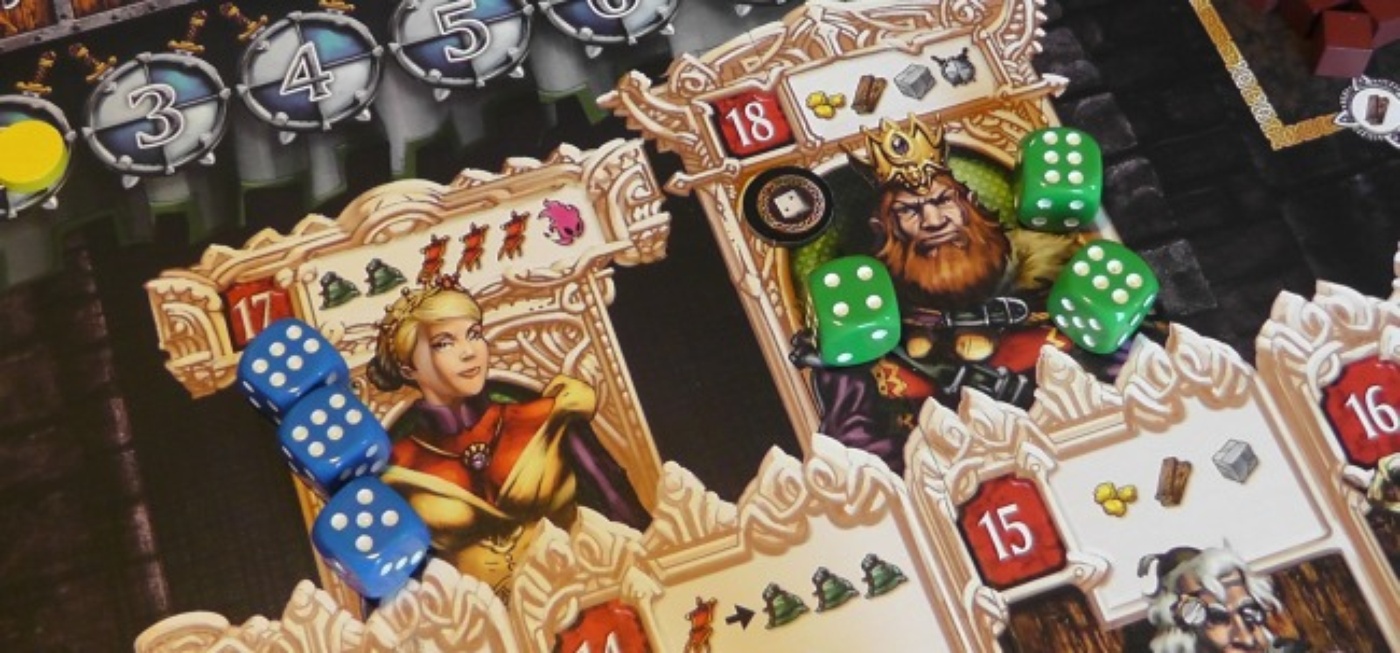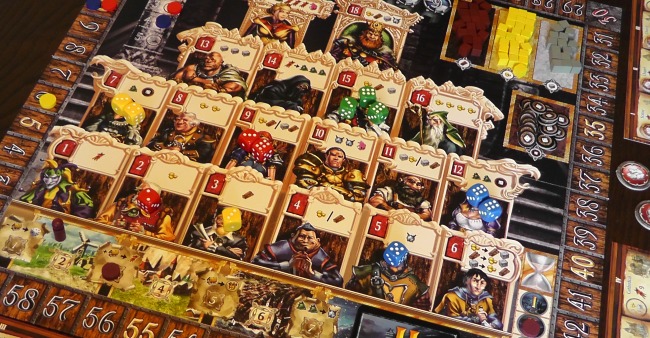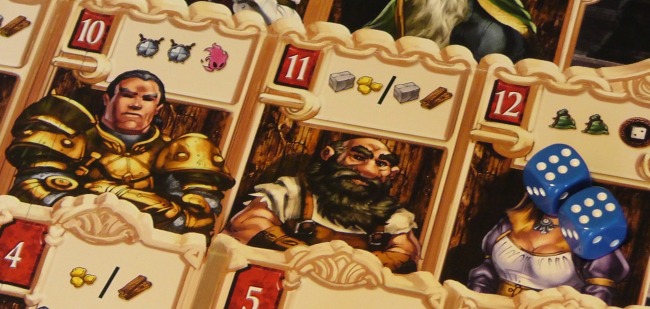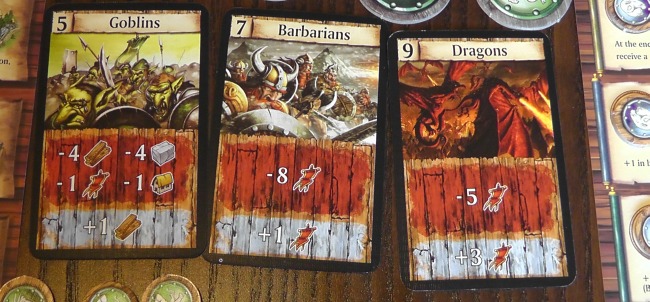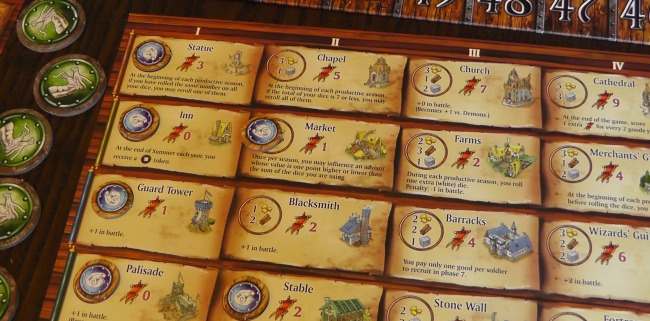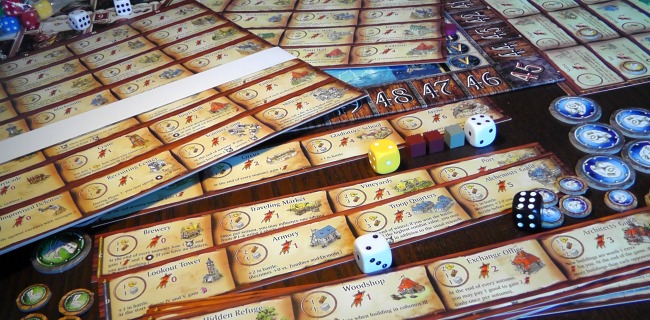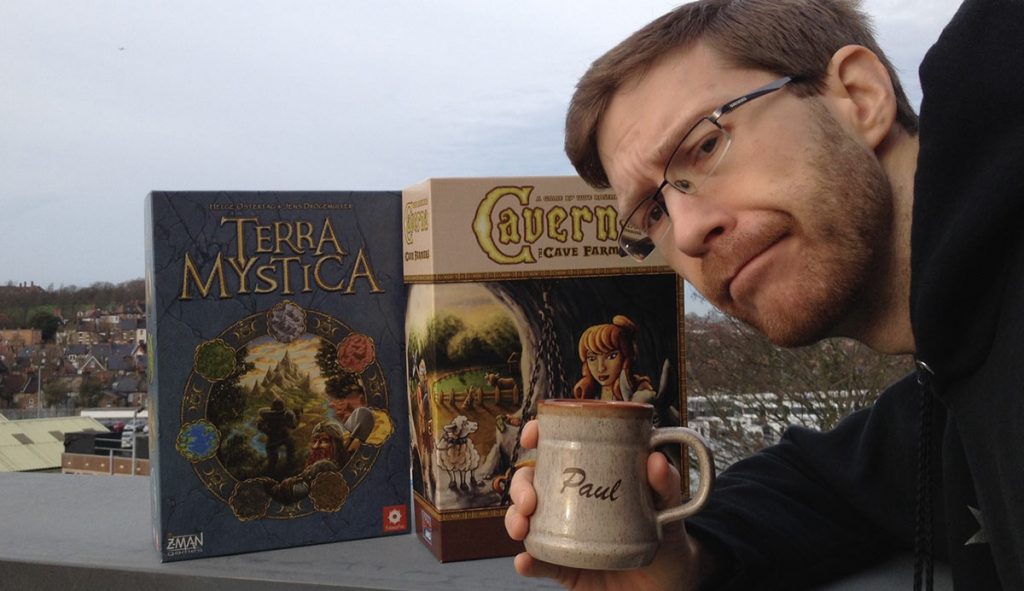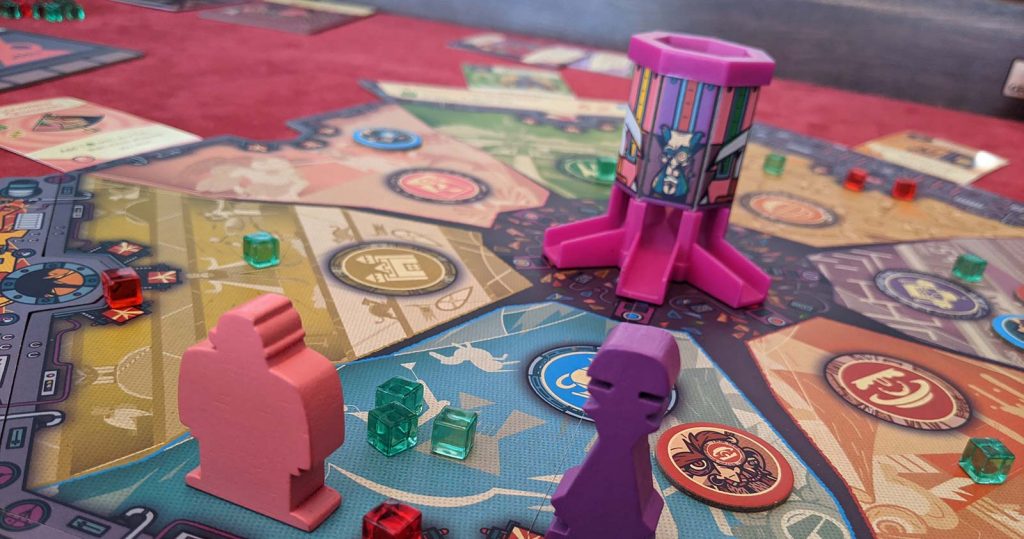Paul: So, you know that Merchants & Marauders game we looked at a couple of weeks back? Well, we didn’t. I was desperate to get my pirate paws on it and Quinns went ahead and played it without me. You know why? His excuse was that I was ill.
That’s not an excuse, that’s just exploiting a good man’s sickness. I could’ve been dying, and there he was, laughing over a game that I could only grasp at in my most moribund of visions.
Kingsburg, then! Here’s a review of both my first and my favourite dice-placement game, and Quinns isn’t allowed anywhere near it. Come with me, readers, as I take you on a right regal journey around its royal court.
At the behest of their wise, noble and beardy king, all the players are building towns, constructing farms and churches and statues and stone walls, or whatever else it is they want to saturate their suburbs with. All these civic improvements are worth victory points, with the bigger ones being worth many more. As we all know, buildings don’t spring up out of thin air and the towns in Kingsburg will need wood, gold and stone before they can start piecing things together.
Who can get you these resources? Why, the royal court, of course. It’s not what you know, but who you know, and the best way to get to know the court, as well as to get the resources they can supply, is to turn up with a handful of dice. Trust me on this.
So what’s this dice placement mechanic? It’s a dead easy, dead smart concept that I loved the moment I saw it. Y’know all those worker placement games, where players put down their pieces on a central board to claim (and often lock out) a particular resource, something they then get to take away and use on a personal board? Well, imagine that, but with dice. Each Kingsburger rolls their own set of coloured dice and then places those dice on the game board. This pretty tableau features all the courtly advisors, each of whom has a number. Roll that number and you get to claim that advisor, with all the resources and bonuses they supply.
Of course, simply sticking to the numbers the dice determine wouldn’t give you any choice, so there are coy ways to manipulate these. For example, in Kingsburg each player rolls three dice. They can then claim spots that are a total of the three, or any combination thereof. Roll a 3, a 5 and a 6 and you can claim spot fourteen, or you can split your dice up and claim spots eight and six. Or spots three, five and six. Or spots nine and five, or… you get the idea? Bigger numbers give better rewards, so you’re immediately choosing whether to grab one big haul, or several smaller ones.
And, if you’re cruel, you’re already looking over the numbers that other players have rolled, as well as the resources they need, and you’re trying to claim spaces before them, so that their town development is stalled, so that their citizens are in danger.
Danger? Oh yes. You didn’t think this was simply a game of carefree construction, of hobnobbing with nobles? Oh dear, no. Each winter, every town in Kingsburg is attacked by monsters. Each year, the monsters get bigger. Quite often, the monsters sack the towns and carry away hard-earned resources or worse, knock over your buildings. There’s a particular word associated with this unfortunate outcome. That word is LAMENTATIONS. You’ll want to ask the court for military assistance and you’ll want to build some good, solid defences before the year is done, otherwise it’s LAMENTATIONS time for you.
To stop you crying all the way down to your socks, you’ll have to make some difficult choices. Does your town consist of little more than cold stone walls, imposing guard towers and bristling palisades? Or is made up of quaint, fragile markets and worryingly flammable farms? The latter will grow your economy, but the former is more likely to still be standing when spring comes.
But don’t panic, because there’s a whole host of ways to try to swing things in your favour. The royal court offers more than just raw materials, with some advisors promising military assistance, additional victory points, bonuses that allow you to manipulate your dice rolls, perhaps – most importantly – a peek at the secret monster card that threatens to swallow your town this year. Many of the buildings you can construct also confer all sorts of advantages, military or otherwise. The crane makes other buildings cheaper, the market makes you more influential at court and the merchant’s guild just gives you gold. Constantly. Spasmodically. Almost like a cat that can’t stop spewing shiny, valuable hairballs.
And all this choice is the very best thing about Kingsburg. How exactly do you want to go about building your town? Will you aim for the most victory points by plumping for lavish but vulnerable constructions, only to watch in horror as goblins carry away the great golden statue you erected? Will you surround yourselves with soldiers, recruiting some from court and build a barracks to train even more? Or are you just going to be cruel and win by intercepting everything the other players want, so their own towns remain undeveloped and unremarkable? You can grasp the game in seconds and yet play it for hours, even days, trying endless combinations of choices.
If all this still isn’t enough for you, Kingsburg also has an expansion which introduces even more building options, along with random events and player characters with special abilities, but buying this would just be greedy. What sort of a person would want even more from a game that’s already so sweet?
I’ll tell you what sort of a person. Quinns. Quinns is that person, hoarding his games in his pirate hold, sneering at other gamers and slashing with his pirate cutlass at anyone who reaches for his collection. I bet he’d snatch every copy of the game and its expansion if he could.
Get yourself a copy of Kingsburg before Quinns steals them all away. If you’ve not played it before then you absolutely must arrange a visit to the royal court. I’ll see you there.
Quinns: The hell is this? Slander!
Paul: You’re not allowed anywhere near this review I say so right there in the third paragraph—
Quinns: Silence! Or I’ll pilfer your booty.
My own feelings on Kingsburg revolve around the design being so miraculously… fluffy. I don’t mean that in a bad way, I just mean the game… it hovers over the table like a cloud, offering happy rewards, lovely dice rolls and inevitable, amusing lamentations as your girlfriend gets her griffon stables pulled down by orcs. If there was an award for Most Loveliest Game In Quinns’ Collection, Kingsburg would both take the prize and give a charming acceptance speech.
The expansion, Kingsburg: To Forge a Realm, however, is a mixed bag. The character cards and random events are underwhelming, while the extra building options add a great deal more Loveliness and allow players to follow more unorthodox building patterns. Paul and myself agree that you should grab Kingsburg, then pick up the expansion only if you feel like spoiling yourself.
Paul: Oh, do we? DO WE?
Quinns: …
Paul: All right, we do.

